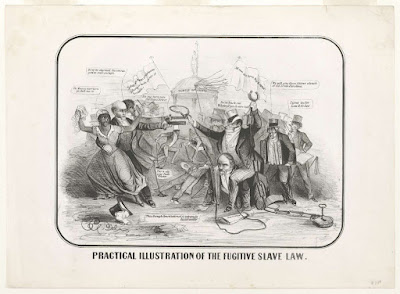HW for April 8: "The Peculiar Institution" of Slavery
“But the church of this country is not only indifferent to the wrongs of the slave, it actually takes sides with the oppressors. It has made itself the bulwark of American slavery, and the shield of American slave-hunters. Many of its most eloquent Divines. who stand as the very lights of the church, have shamelessly given the sanction of religion and the Bible to the whole slave system. They have taught that man may, properly, be a slave; that the relation of master and slave is ordained of God; that to send back an escaped bondman to his master is clearly the duty of all the followers of the Lord Jesus Christ; and this horrible blasphemy is palmed off upon the world for Christianity."
[Frederick Douglass, "What to the Slave is the Fourth of July" - anthology p. 217]
Looking at this quote, from Douglass's famous speech that is one of the principal readings for next week (start it as soon as you can!), try to ascertain how much it is funded on the reality of the time, by pitting it against the pro-slavery arguments by the Virginian Methodist Reverend William A. Smith (anthology, pp. 193-194) and the racially-biased social theorist George Fitzhugh (194-196)
Missouri Compromise 1850
Cartoon 1851 (signed E. C., explanation here)



The nineteenth century was marked by a fundamental issue: being for or against slavery. Countless debates and conferences were held regarding the admission of slavery in America, with two distinct factions emerging: the North, which abolished it, and the South, which deemed it justifiable. There were even those, like the author George Fitzhugh, who considered it a natural and beneficial system for both masters and slaves, asserting that the latter could only thrive under slavery as they were incapable of achieving otherwise. According to the author, black slaves in the South even lived better than any free white man. Alongside clergyman William A. Smith, he advocated for slavery, openly justifying it using religion and the Bible itself. Smith even deemed it an acceptable institution compatible with religious doctrine. Furthermore, Fitzhugh stated that this societal statute "has been almost universal, and which is expressly and continually justified by Holy Writ." Taking a completely different stance was Frederick Douglass, a former black slave, as expressed in his speech "What to the Slave Is the Fourth of July?" delivered on July 5, 1852. This speech is as lengthy as it is captivating and emotional to read, especially in the way he describes his and his comrades' harrowing experiences forced to endure inhumane conditions of slavery. Returning to the quote, without dwelling too much on the rest, I believe it expresses a recurring theme in human history: that the Church has often sided with oppressors against the weaker. Unfortunately, this is not a new revelation. In this case, he notes how the Church managed to indoctrinate once again, asserting that "to send back an escaped slave to his master is clearly the duty of all followers of the Lord Jesus Christ." In this brief excerpt, it's evident that he aims to highlight the growing distrust he holds towards the church and Christianity, which, once again, teach that man can be a slave.
ReplyDeleteFrederick Douglass's condemnation of the church's complicity in slavery, as expressed in his speech, aligns closely with the realities of his time. Douglass, himself a former slave turned abolitionist, witnessed firsthand the cruelty and injustice of the institution of slavery in the United States. He experienced the dehumanizing effects of being treated as property and denied basic human rights. His assertion that the church not only ignored the plight of slaves but actively supported the slave system reflects a painful truth of American history.
ReplyDeleteIn contrast, the pro-slavery arguments put forth by Reverend William A. Smith and George Fitzhugh sought to justify and perpetuate the institution of slavery. Smith, in his defense of slavery, relied heavily on biblical interpretations to argue that slavery was sanctioned by God and that it was the duty of Christians to obey the laws of the land, including returning escaped slaves to their masters. His perspective, while rooted in religious doctrine, conveniently ignored the inherent immorality and cruelty of enslaving fellow human beings.
Similarly, George Fitzhugh, a proponent of racial hierarchy and slavery, advanced arguments based on his belief in the inferiority of African Americans and the supposed benefits of slavery for both slaves and slaveholders. He viewed slavery as a paternalistic institution that provided care and protection to inferior races while also serving the interests of the dominant white society. Fitzhugh's views, although couched in pseudo-scientific language and social theory, were fundamentally racist and dehumanizing.
When comparing Douglass's critique with the pro-slavery arguments of Smith and Fitzhugh, it becomes clear that Douglass's perspective is grounded in the harsh realities experienced by enslaved individuals. His condemnation of the church's complicity in slavery resonates with the lived experiences of those who suffered under the institution. In contrast, the pro-slavery arguments of Smith and Fitzhugh rely on theological justifications and racial prejudice to uphold a system of oppression and exploitation. By juxtaposing these perspectives, one can discern the stark contrast between the moral imperative to fight against injustice, as advocated by Douglass, and the morally bankrupt rationalizations used to defend slavery.